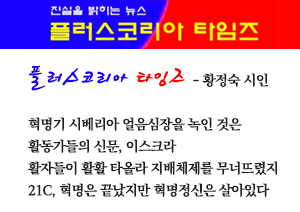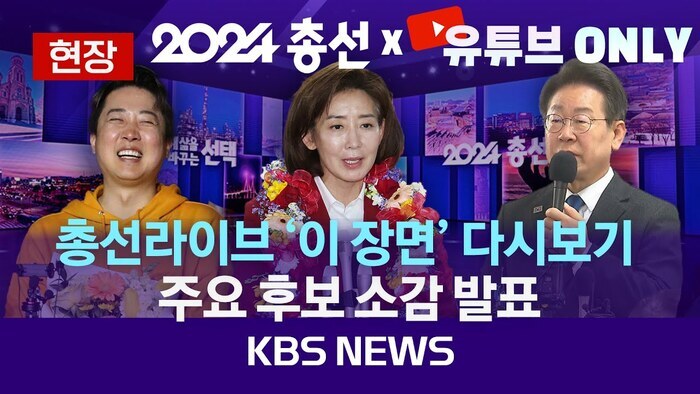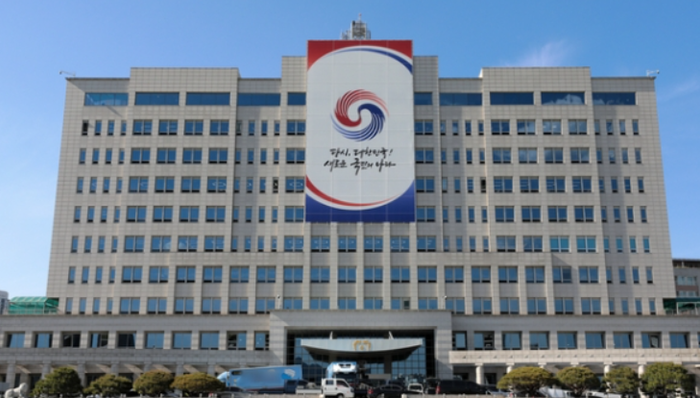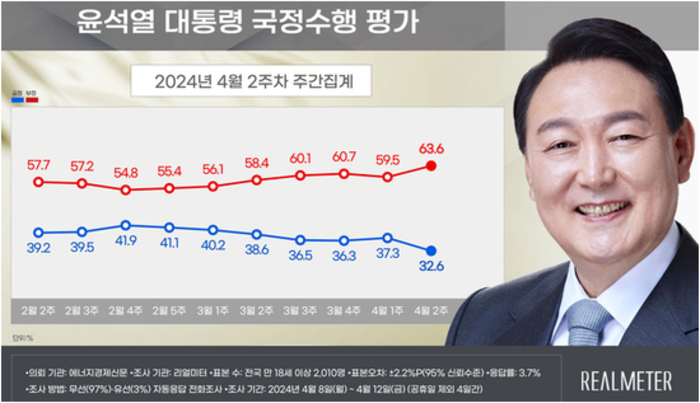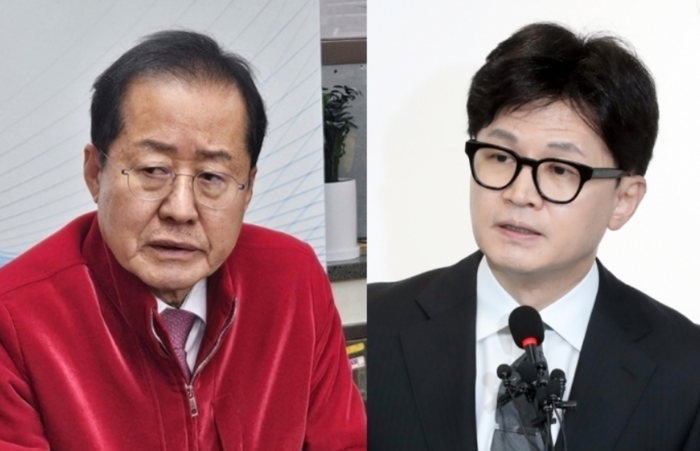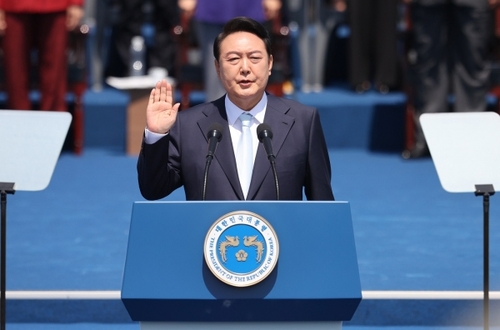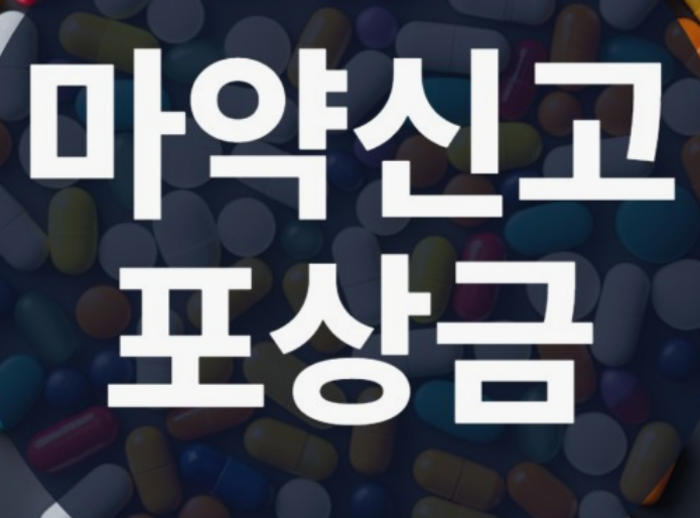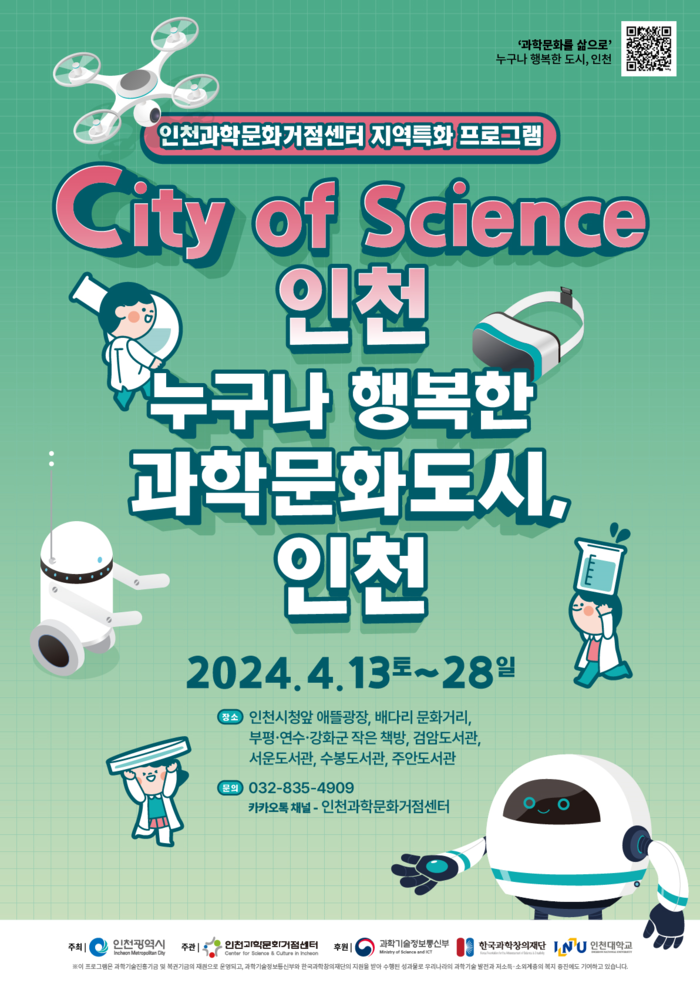|
[21세기 세계 주도의 핵심사상으로 일컬어지고 있는 홍익인간 사상에 관하여, 우리나라가 이제 지향해야 할 새로운 홍익인간 사상의 현대화 적용이론을 개발하여 제시하고자 한다. 본 내용은 임기추박사의 저서 “홍익인간 사상의 현대화 적용이론”(2022)을 60여회로 나누어 연재한다. 편집자 주]
2) 홍익인간 사상의 현대적 실천방법 고찰
홍익인간과 재세이화의 개념
홍익인간의 개념에 대해 보통 “널리 (크게) 인간을 이롭게 한다”(정영훈, 2013, 24)로 알고 있다. 그러나 박정학(2004; 2017, 31)의 연구결과에서 홍익의 의미를 우리의 이익, 또는 모두 이익(all-win)으로 해석, 신용하(2019, 236) 논문에서는 홍익의 ‘홍’을 ‘크게’나 ‘모두,’ 그리고 ‘익’을 현대의 이익으로 풀이하면서 홍익을 “널리 크게 돕고 이롭게 한다”라고 해석하였다. 그런데 모두 이익이란 “모든 개별 사람들의 이익이 아니라 작게는 가정이나 나라, 민족, 크게는 아시아, 지구 전체를 한 덩어리로 본 지구촌의 이익이라는 뜻이고, 바로 세계화가 추구해야 하고 우리 모두가 추구해야 할 목표인 홍익인간이 되는 것”으로 주장하였다(박정학, 2004). 따라서 본고에서는 홍익인간의 개념을 “널리 (크게) 인간을 이롭게 한다”는 기존 해석 대신에, ‘인간을 모두 이롭게 한다’ 또는 ‘모두 이익이 되도록 한다’로 해석할 수 있다. 기존 홍익인간에 대한 해석보다, “인간을 모두 이롭게 한다.”로 바꾸는 해석이 조금 더 명확한 의미가 있다고 본다.
재세이화에 관한 선행연구사례를 보면, 우선 임재해(2013, 495-533)의 분석에서 “홍익인간의 이념 아래 신시(神市)를 세우고 주곡(主穀), 주명(主命), 주병(主病) 등의 관리들이 360여 인간사를 재세이화의 방법으로, 통치한 높은 수준의 ‘신시고국’ 역사를 변모시키게 된다.”라는 내용과 “재세이화는 초기 문화에서 비롯된 가치관으로 통치한 것으로 주장하였다. 민영현(2009, 211-212)은 참전계경의 내용 또한 “일상생활과 개인 수행 및 심성연마의 지침을 중심으로 구성되어 있는 것으로 설명”하고 있다. 조석봉(2013)은 “수기치인(修己治人) 요건에서 홍익인간(弘益人閒)은 수기(修己), 재세이화(在世理化)는 치인(治人)에 해당한다고 해석하고 있다. 이에 따라 전자가 강령이나 규범이라면, 후자는 정책 시행이라 주장”하였다. 조명래(2011, 78)는 참전계경의 “366사(事) 체계를 오늘날 현대국가의 법령과 같은 의미를 내포하고 있는 것으로 분석”하였다.
이러한 연구결과를 바탕으로 한 재세이화의 개념은 일상생활과 개인 수행이나 심성연마의 지침 등으로 다스리는 이치로, 오늘날 현대국가의 법령·정책 시행과 사회규범·관습의 준수 및 개인수신 등의 실천이라고 말할 수 있다.
홍익인간 사상의 실천방법
고대 조선 11세 도해단군조에서는 염표문의 마지막 구절(김은수, 1985, 63-64; 김철수, 2015, 6-7)에, “그러므로 하느님(一神)께서 참마음을 내려 주셔서 사람의 본성을 광명으로 통해 있고 하느님의 가르침으로 세상을 다스리고 교화하여 인간을 모두 이롭게 하라는 것이니라(고(故)로 일신강충(一神降衷)하사 성통·광명(性通光明)하니 재세이화(在世理化)라야 홍익인간(弘益人間)이라 하다)”라고 명문화되어 있다. 이 명문에서는 홍익인간하기 위해서 일신강충으로 성통광명과 재세이화가 필수조건임을 말한다고 할 수 있다.
홍익인간 사상의 전승은 환국(마지막 지위리 환인)에서 전수받은 신시배달국 1대 거발한 환웅(기원전 3898년)으로부터 비롯되었다. 2,000여년 후에 고대조선 도해(道奚, 서기전 1891년 즉위, 재위 57년)단군은 지위리 환인천왕의 염지표(念之標)를 염표문으로 완성한 것이다. 또한 환국에서 배달, 조선, 고구려, 이어 발해 등으로 전승되었다. 김구 주석은 “(중략) 세계의 평화가 실현되기를 원한다. 홍익인간이라는 우리 국조단군의 이상이 이것이라고 믿는다.”라고 하였다(김구, 2020). 오늘날 홍익인간 이념은 대한민국의 1949년말 법률 제86호인 교육법 제2조 교육이념으로 이어졌다.
그런데 조한석(2019, 197)은 “성통(性通)은 ‘재세이화·홍익인간’의 구현이라는 공완(功完)을 이루기 위한 전제조건인 동시에 인간의 자기실현을 위한 필수조건”이라고 하였다. 김철수(2015, 7)는 홍익인간의 이념에 대한 재세이화를 “홍익인간의 구체적 방법이자 실천수단의 의미를 지닌다”고 보았다. 조옥구(2012)는 “성통·공완과 재세이화는 ‘홍익인간’하는 2가지 방법론에 해당하고 이 2가지 방법론을 통하면 ‘홍익인간’에 이를 수 있음을 말해주는 것이 이들 ‘성통·공완’, ‘재세이화’, ‘홍익인간’의 상호관계라 기술”하였다.
그러므로 홍익인간이라는 관점에서 볼 때, 재세이화란 홍익인간을 위한 필수조건이고, 성통·공완도 마찬가지로 홍익인간을 위한 하나의 전제조건이라 할 수 있다. 이와 같은 홍익인간 사상의 실천방법을 설명하자면, 홍익인간 사상의 현대적 적용을 위한 주요 전제조건인 성통·공완 수행과 재세이화의 실천이라는 조건이 충족될 때 가능한 것이고, 성통·공완과 재세이화라는 조건을 충족하는 것이 홍익인간 사상의 실천방법이라고 할 수 있다.
제1 전제조건인 성통·공완의 수행
성통·공완 수행은 선행연구(박진규, 2012, 233-239; 이근철, 2010, 77-88)에 의하면 삼일신고(진리훈)에 명시한 지감(止感)·조식(調息)·금촉(禁觸)의 수행을 통해서 완성경지인 성통(性通)·공완(功完)에 도달할 수 있다. 삼일신고에 의거한 기본적 수행원리는 간단히 말해서 마음(감정) 기억과 기(숨결) 기억 및 몸(감각) 기억 등을 돌아보고 버려서 본성·본명·본정을 회복하는 것이다. 성통·공완 수행방법은 주문읽기의 주문수행과 지식과 경험을 위시한 지혜와 물질생활 및 생명력을 닦아가는 지생쌍수법의 유형이 있다.
본고에서는 이근철(2010)과 박진규(2012)의 논문에 의거 삼일신고의 지감·조식·금촉에 대한 3법수행 방법 개요를 약술한다. 대략적인 수행기법은 법령·제도적 결정권자는 물론 일반시민들과 함께, 1) 기쁨·두려움·슬픔·성냄·탐욕·싫어함 등의 6감(감정) 수행, 2) 향기·썩은내·차가움·더위·메마름·습기 등의 6식(숨결) 수행, 3) 소리·색깔·냄새·맛·성욕·부딪침 등의 6촉(감각) 수행 등 모든 거짓 기억을 떠올려 버리는 명상 수련으로 수행할 수 있다.
여기서, 법령·제도적 결정권자의 개념은 정영훈(2013, 27-28) 논문에제시한 통치자와 관리계급 또는 백성 등과의 관계에 참고하여, 대통령을 비롯한 입법·사법·행정기관에서 법령·제도적 입법·판결·결정에 관계된 모든 직무 수행자라고 말할 수 있다. 정영훈(2013, 28)이 홍익인간 사상을 “피치자-백성-민중 등과의 관계를 맺고 있는 것으로 보고, 통치자와 관리계급 또는 국가기능의 보살핌이나 다스림을 받는 존재들이며, 재세이화라는 권력작용의 대상”이라고 주장한 바를 참조한 것이다.
이근철(2010)과 박진규(2012)의 논문에 의하면, 성통과 공완 수행을 위한 명상의 수행결과로 지감수행의 경지는 선악이 없이 일상생활 속에서 종일 내내 유지된다면 대덕의 확인, 조식수행의 경지는 청탁이 없이 일상생활 속에서 종일 내내 유지된다면 대혜의 확인, 그리고 금촉 수행의 경지는 후박이 없이 일상생활 속에서 종일 내내 유지된다면 대력의 확인이 가능하다고 말할 수 있다.
이와 같이 삼일신고에서 의거한 지감·조식·금촉 수행이 우리 한민족 고유의 수행법으로 전승되어 온 것이다. 본고에서는 이러한 수행으로 “성통 이후에야 도덕적 책임감을 실천하는 존재임을 자각”(김광린, 2015, 6)하고 나서 “정치공동체의 이념을 실현할 수 있고, 홍익인간을 양성하는 수련법”이라고 강조한 연구결과(김광린, 2015, 29)에 주목한다. 이것은 성통·공완수행 이후 선한 본성, 맑은 본명 및 두터운 본정을 다시 회복하여 변화됨(이근철, 2010, 72; 박진규, 2012, 238)을 의미하고, 도덕적 책임감을 갖고서 실천이 가능(김광린, 2015)하리라고 보기 때문이다.
도덕적 책임감의 자각과 실천에 대한 확인절차는 홍익인간 사상의 실천방법인 성통·공완의 충족여부와 재세이화의 충족여부와 함께 선문답 방식, 사회과학 조사방식을 통하여 확인이 가능하다. 성통·공완 수행은 재세이화의 실천과 함께 충족 확인이 전제되어야 도덕적 책임감 하에서, 오늘날의 법령·제도의 바른 결정과 공정한 집행에 관한 현대적 국정운영의 실현이나 적용 노력이 가능하다고 판단할 수 있을 것이다. 성통·공완이란지감·조식·금촉의 삼일신고 3법수행 이론에 의거(이근철, 2010; 박진규, 2012), 마음(감정), 기(숨결), 몸(감각) 등에 관한 떠오르는 모든 기억을 모두 그대로 다 버려서 다시 찾아보는 수행의 경지라고 할 수 있다. 성통·공완 수행을 충족한 이후에 도덕적 책임감의 자각을 갖도록 변화될 수 있으며(김광린, 2015), 이에 따라 올바른 논의 및 공정한 결정이 이루어질 것으로 기대된다. 이를 통해서 법률 및 규범 준수 등과 같은 재세이화의 실천으로 나타나게 되고, 법령·제도적 결정권자가 일반시민들에게 모두 이익을 추구할 수 있을 것으로 예상한다.
제2 전제조건인 재세이화의 실천
앞에 언급한 재세이화의 개념과 선행연구사례(임기추, 2018, 2019)를 참조하여 홍익인간 사상의 현대적 적용을 위한 재세이화 실천과 관련 국내의 실천범위를 요약하면, 시민사회 입장에서 개인수신과 국민 의무를 비롯해 법제와 사회규범 및 관습 등을 준수하는 것이다. 여기에 지도자적 입장의 경우에는 추가적으로 시도지사나 국회의원관련 의무·법제 등을 준수하고, 나아가서 대통령관련 의무·법제 등의 준수가 확보돼야 하는 것이다.
국민의 의무를 살펴보면, 헌법상의 교육·근로·납세·병역·공공복리적합의무, 환경보전의 의무와 조국 충성·헌법옹호나 법률준수의 의무 등으로 열거되어 있다(한국민족문화대백과사전a, 2016). 국회의원의 헌법·국회법상 의무로는 헌법 준수·청렴과 국익의 우선·지위남용과 영리행위 금지·겸직금지와 기타 국회내 여러 의무 등이 있다(한국민족문화대백과사전b, 2016). 시도지사의 경우에는 해당 지방자치단체와 영리 목적상 거래와 영리사업 금지와, 국회의원이나 지방의회의원, 대통령령상 겸직 금지 등이 명시되어 있다(한국어위키백과, 2016).
대통령의 경우에는 헌법상 의무로 직무관련 의무와 겸직금지의 의무로 나누는데, 직무에 관한 의무로는 헌법준수 의무와 국가보위·조국평화통일·국민의 자유, 복리증진·민족문화창달 의무 등이 있다(두산백과, 2016). 또한 대통령을 비롯해 국회의원·시도지사·공무원 등의 선서와, 검사·판사 선서, 변호사는 물론 목사·교원·기자 등 윤리강령 준수도 포함된다. 이외에 행동규범이나 내규 등의 준수·이행 의무사항에 대해 말하자면, 생활규범의 준수(신규 및 변경 준수도 포함), 일반사회의 각종 제도나 행동규범은 물론 윤리강령 등의 의무사항을 준수해야 한다.
재세이화의 지구촌적 주요 실천사명에 대해 말하자면 “지구촌시대에 세계 인간존중 의식과 민주화를 비롯해서 평화 및 경제문제와 인류사회의 복지, 지구촌의 문화, 지구 환경보전 등 사명”을 약술할 수 있다(구체적 내용은 서보근(2012, 35-41) 참조).
이와 같이 국내 재세이화의 주요 실천내용과 지구촌적 주요 실천사명이 이루어질 때 홍익인간 사상의 현대적 적용을 위한 전제조건이 충족되는 것으로 볼 수 있다. 다시 말해서, 성통·공완 수행의 확인과 재세이화의 실천여부 확인이 전제되어야, 홍익인간 사상의 현대적 적용을 위한 국정운영상의 특정 사안관련 당사자 및 이해관계자 간에 도덕적 자각과 실천으로(김광린, 2015, 6), 모두에게 이롭게 올바른 논의와 결정 및 공정한 시행들이 가능할 것으로 본다. 대통령을 위시한 법령·제도적 결정권자가 지감·조식·금촉의 3법수행 이후 도덕적 책임감의 자각과 실천을 증진시킬 수 있다면, 실제 국정운영의 결정시 신뢰도의 향상과 공정성의 제고 등에 더욱 긍정적 효과를 높일 수 있을 것이다. 여기서, 당사자란 어느 정책이나 사안관련 직접적 법령·제도적 결정에 영향을 받는 자를 의미하고, 이해관계자란 간접적 영향 또는 이해가 관련된 자라 할 수 있다.
따라서 인간을 개인과 집단 구성원의 집합으로 보면, 홍익인간의 개념은 성통·공완과 재세이화의 실천을 전제로 정당한 개인 이익을 추구하거나 집단 구성원의 모두 이익을 추구하는 존재로 정할 수 있다. 다시 말해서, 성통·공완 수행 이후 정당한 개인 이익의 추구나 집단 구성원 전체의 이익을 공유하기 위한 국내의 주요 실천의무와 지구촌의 주요 실천사명을 인식하여 홍익인간의 사명을 전적으로 실행하는 것이 홍익인간 사상의 현대적 실천방법이라 말할 수 있다.
*필자/임기추 박사
홍익경영전략원 원장/유튜브 홍익나라(https://www.youtube.com/channel/UCp77kpD3e2PDSg6OHI8LJTw) 운영자(tranlim@hanmail.net).
*아래 영문은 위 기사를 '구글 번역'으로 번역한 [기사전문]입니다. 영문 번역에 오류가 포함되어 있을 수 있음을 전제로 합니다. *The English below is the [full text] of the article translated by 'Google Translate'. It is assumed that the English translation may contain errors.
[Regarding Hongik Ingan Ideology, which is said to be the core ideology leading the world in the 21st century, I would like to develop and present a theory of modernization application of the new Hongik Ingan ideology that Korea should now pursue. This article is a series of 60 episodes of Dr. Lim Ki-chu’s book “Modernization Theory of Hongik Ingan Ideology” (2022, Kyobo Purple). Editor's Note]
[Modernization Theory of Hongik Ingan Ideology -34] State Administration: Practice of Ideology
2) Consideration of modern practices of Hongik Ingan ideology
The concept of Hongik Ingan and Jaeseihwa
Regarding the concept of Hongik Ingan, an ordinary ruler knows it as “widely (largely) benefiting human beings” (Jeong Young-hoon, 2013, 24). However, in the research results of Park Jeong-hak (2004; 2017, 31), the meaning of Hongik was interpreted as our profit or all-win, and Shin Yong-ha (2019, 236) interpreted the 'hong' of Hongik as 'large' or 'big'. 'Everyone' and 'Ik' were interpreted as modern interests, and Hongik was interpreted as "to help and benefit widely and greatly." However, profit for all means “not the interests of all individual people, but the interests of families, countries, peoples, Asia, and the global community at a large scale. The goal is to become a Hongik Ingan” (Park Jeong-hak, 2004). Therefore, in this paper, the concept of Hongik Ingan can be interpreted as 'benefiting all humans' or 'making all benefit' instead of the existing interpretation of "broadly (largely) benefiting humans". I think that the interpretation of changing it to “benefit all humans” has a slightly clearer meaning than the existing interpretation of Hongik Ingan.
In the case of previous research on Jaeseihwa, first of all, in the analysis of Lim Jae-hae (2013, 495-533), “...the method of Jaeseihwa, a high level of government... It is claimed that “Jaeseihwa ruled with the values derived from the early culture. Min Yeong-hyeon (2009, 211-212) also explains that the content of the Warfare Warfare is “constructed around guidelines for daily life, individual practice, and mental training.” Cho Seok-bong (2013) said, “In the requirements for self-cultivation, Hongik Ingan (弘益人閒) is self-discipline, and Jaeseihwa (在世理化) is self-governing. It is interpreted as corresponding to Accordingly, while the former is a code or norm, the latter is a policy implementation.” Cho Myung-rae (2011, 78) analyzed the “366 incident system” of the war vigilance as having the same meaning as the laws and regulations of today’s modern state.
The concept of Jaeseihwa, based on these research results, is a principle that governs daily life, personal practice, and mental training guidelines. You could say it's practice.
How to practice Hongik Ingan ideology
In Dohae Dangunjo, the 11th king of the ancient Joseon Dynasty, the last verse of Yeompyomun (Kim Eun-soo, 1985, 63-64; Kim Cheol-soo, 2015, 6-7) reads, “Therefore, God (一神) bestows the true mind and transmits human nature through light. It is to govern and edify the world with the teachings of God so that all human beings can benefit. It is stipulated. In this inscription, it can be said that in order to become Hongik Ingan, Seongtong Gwangmyeong and Jaeseihwa are essential conditions.
The transmission of the idea of Hongik Ingan originated from Hwanung (3898 B.C.), the first generation of Sinsi Baedalguk, who was handed down from Hwan-guk (the last Jiri-ri Hwan-in). 2,000 years later, Dangun Dohae of the ancient Joseon Dynasty completed Yeomjipyo of King Hwanincheon in Jijiri with Yeompyomun. It was also handed down from Hwanguk to Baedal, Joseon, Goguryeo, and then to Balhae. President Kim Koo said, “(omitted) I want world peace to come true. I believe that this is the ideal of our national team called Hongik Ingan” (Kim Gu, 2020). Today, the Hongik Ingan ideology has led to the education ideology of Article 2 of the Education Act, which is Law No. 86 at the end of 1949 in the Republic of Korea.
By the way, Cho Han-seok (2019, 197) said, “Seongtong is a precondition for achieving the realization of ‘Jaeseihwa and Hongik Ingan’, and at the same time a necessary condition for human self-realization.” did Kim Chul-soo (2015, 7) viewed Jaeseihwa on Hongik Ingan's ideology as "having the meaning of Hongik Ingan's specific method and means of practice." Cho Ok-gu (2012) said, “Seongtong·Gongwan and Jaeseihwa correspond to the two methodologies of 'Hongik Ingan', and through these two methodologies, 'Hongik Ingan' can be reached. It is described as the mutual relationship between these 'Seongtong·Gongwan', 'Jaeseihwa', and 'Hongik Ingan'.
Therefore, from the point of view of Hongik Ingan, Jaeseihwa is a necessary condition for Hongik Ingan. Seongtong and Gongwan are likewise a precondition for Hongik Ingan. To explain how to practice Hongik Ingan thought like this, it is possible when the conditions of Seongtong·Gongwan practice and Jaeseihwa practice, which are the main prerequisites for the modern application of Hongik Ingan thought, are met. Satisfying the conditions of Seongtong·Gongwan and Jaeseihwa can be said to be the practice method of Hongik Ingan thought.
Performance of Sungtong and Gongwan, the first prerequisite
According to previous studies (Park Jin-kyu, 2012, 233-239; Lee Geun-cheol, 2010, 77-88), the practice of Seongtong and Gongwan was Jigam (止感) and Josik (調息) specified in the Samil Singo (Jinrihun). ), and through the practice of Geumchok (禁觸), it is possible to reach the perfection state of Seongtong (性通)·Gongwan (功完). The basic practice principle based on the Samil Shingo is simply to look back and throw away the memory of the mind (emotion), memory of qi (breath), and memory of the body (sensory) to restore one's true nature, true name, and true nature. Seongtong and Gongwan practice methods include the practice of spell reading and the Jisengssangsoobeop method of cultivating wisdom, material life, and vitality, including knowledge and experience.
In this paper, based on the papers of Lee Geun-cheol (2010) and Park Jin-gyu (2012), we outline the three methods of performing the three laws of Jigam, Josik, and Geumchok of the Samil Singo. A rough practice technique is to practice 6 senses (emotions) such as joy, fear, sadness, anger, greed, and dislike with the general public as well as legal and institutional decision makers. In addition, 2) perform the six senses (breath) of scent, rotten smell, cold, heat, dryness, and moisture, and 3) perform the six senses (senses) of sound, color, smell, taste, sexual desire, and touch. It can be practiced as a meditation practice to recall false memories.
Here, the concept of statutory and institutional arbiter refers to the relationship between the ruler and the administrative class or the people presented in the thesis by Young-Hun Jeong (2013, 27-28), and is used in legislative, judicial, and administrative agencies including the President to legislate, judge, and decide. It can be said that all related duties are performed. Jeong Young-hun (2013, 28) sees the idea of Hongik Ingan as having a relationship with “subjects - people - people, etc., beings who are cared for or governed by rulers and administrative classes or state functions, and the power action called Jaeseihwa. It refers to what it claims to be the subject of.
According to the thesis of Lee Geun-cheol (2010) and Park Jin-gyu (2012), if the state of Jigam practice is maintained throughout the day without good and evil as a result of meditation for the performance of Seongtong and Gongwan, confirmation of great virtue, Josik practice If the state of being is maintained throughout the day in daily life without asking for favors, it is a confirmation of great benefits. And if the state of Geumchok practice is maintained throughout the day in daily life without hindsight, it can be said that it is possible to confirm the great force.
In this way, the practice of Jigam·Josik·Geumchok based on the Samil Shingo has been handed down as a unique Korean people's practice. In this paper, it is said that this practice "recognizes that one is a being who practices moral responsibility after Seongtong" (Kim Gwang-rin, 2015, 6). And he emphasized that it is “a training method that can realize the ideology of a political community and nurture Hongik Ingan” (Kim Gwang-rin, 2015, 29). This is because it is believed that it will be possible to practice with a sense of moral responsibility (Kim Gwang-rin, 2015).
Practice of Jaeseihwa, the second prerequisite
Referring to the concept of Jaeseihwa mentioned above and previous research cases (Ki-Chu Lim, 2018, 2019), the scope of practice in Korea related to the practice of Jaeseihwa for the modern application of Hongik Ingan thought In summary, from the point of view of civil society, it is to comply with the laws, social norms and customs, as well as personal and public obligations. Here, in the case of a leadership position, additionally, compliance with duties and laws related to provincial governors and members of the National Assembly, and furthermore, compliance with duties and laws related to the president must be secured.
Looking at the duties of the people, they are enumerated as constitutional education, labor, tax payment, military service, public welfare obligations, environmental preservation obligations, loyalty to the country, constitutional protection, and legal observance (Encyclopedia of Korean National Culture a, 2016). The duties of members of the National Assembly under the Constitution and the National Assembly Act include compliance with the Constitution, integrity and prioritization of national interests, prohibition of abuse of position and profit-making activities, prohibition of concurrent offices, and other duties within the National Assembly (Encyclopedia of Korean National Culture b, 2016). In the case of provincial and provincial governors, the prohibition of for-profit transactions and for-profit business with the relevant local government, as well as for members of the National Assembly or local councils, and prohibition of holding concurrent offices in the presidential decree are specified (Korean Wikipedia, 2016).
In the case of the President, the constitutional duties are divided into duty-related duties and duties prohibiting concurrent office. Duty-related duties include the duty to comply with the Constitution, national defense, peaceful reunification of the country, freedom of the people, promotion of welfare, and promotion of national culture. (Doosan Encyclopedia, 2016). It also includes the oaths of the president, members of the National Assembly, city and provincial governors, and public officials, as well as the oaths of prosecutors and judges, and compliance with the Code of Ethics by pastors, teachers, and reporters as well as lawyers. In addition to the obligations to comply with and fulfill the code of conduct or by laws, we must comply with the norms of life (including compliance with new and changed ones), various systems and codes of conduct in the general society, as well as the code of ethics.
As for Jaeseihwa's major global practical missions, it can be summarized as "the missions of peace and economic issues, welfare of human society, global culture, and global environmental preservation, including global human respect and democratization in the global village era." (see Seo Bo-geun (2012, 35-41) for specific details).
In this way, it can be seen that the prerequisites for the modern application of Hongik Ingan ideology are satisfied when the main practices of Jaeseihwa in Korea and the main missions of global practice are fulfilled. In other words, the confirmation of the performance of Seongtong and Gongwan and the confirmation of the practice of Jaeseihwa must be premised, so that for the modern application of Hongik Ingan ideology, moral awareness and practice among parties and stakeholders related to specific issues in state administration (Kim Gwang-rin, 2015, 6), it is believed that correct discussions, decisions and fair implementation will be possible for the benefit of everyone. If statutory and institutional decision makers, including the president, can enhance awareness and practice of moral responsibility after performing the three laws of Jigam, Josik, and Geumchok, the reliability and fairness of actual state administration decisions will be improved. could have a more positive effect. Here, a party refers to a person who is directly affected by a policy or issue-related statutory or institutional decision, and a stakeholder refers to a person who has an indirect influence or interest.
Therefore, when human beings are viewed as a set of individuals and group members, the concept of Hongik Ingan is a being that pursues legitimate individual interests or the interests of all group members on the premise of practicing Sungtong, Gongwan, and Jaeseihwa. can be set as In other words, it is to fully implement the mission of Hongik Ingan by recognizing the major practical duties in Korea and the major practical missions of the global village to pursue legitimate individual interests or share the interests of all group members after performing Seongtong and Gongwan. It can be said that it is a modern practice method of Hongik Ingan thought.
*Writer/Lim Ki-chu
Hongik Institute of Management Strategy & Director/YouTube Hongik Nara(https://www.youtube.com/channel/UCp77kpD3e2PDSg6OHI8LJTw) Channel Operator <저작권자 ⓒ pluskorea 무단전재 및 재배포 금지>
홍익경영전략원 원장・경영학박사, 홍익사상학자 / 유튜브 홍익나라 채널운영자 / 단군정신선양회 학술위원 / 전 에너지경제연구원 연구위원 / 전 행정안전부 시도합동평가단 평가위원 / 전 국무총리 기후변화협약대책위원회 평가위원 / 전 대통령자문 지속가능발전위원회 전문위원 / 전 대통령직속 민주평화통일자문회의 자문위원 / 홍익인간 사상관련 50여권의 저서 및 11편의 학술논문 발표

hongikingan, hongik ingan, jaeseihwa, 홍익인간, 재세이화, 관련기사목록
|
연재
많이 본 기사
|



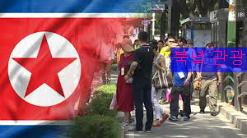

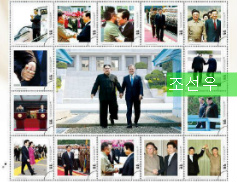
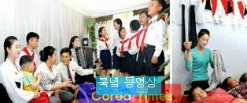

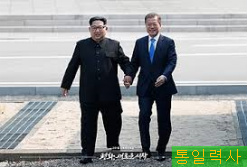
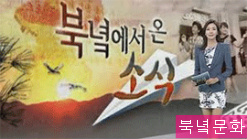






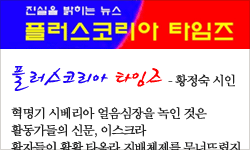


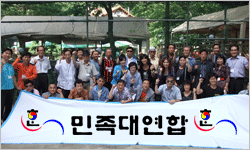
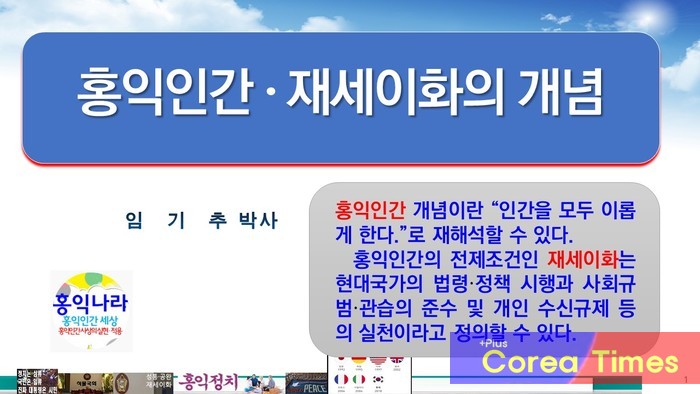






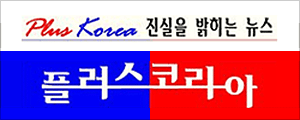

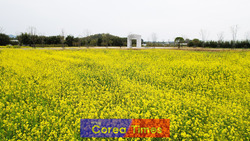

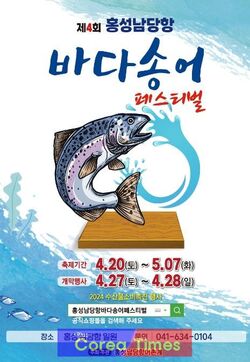
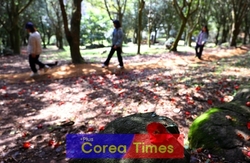
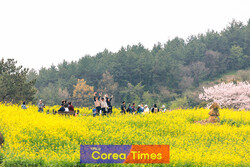



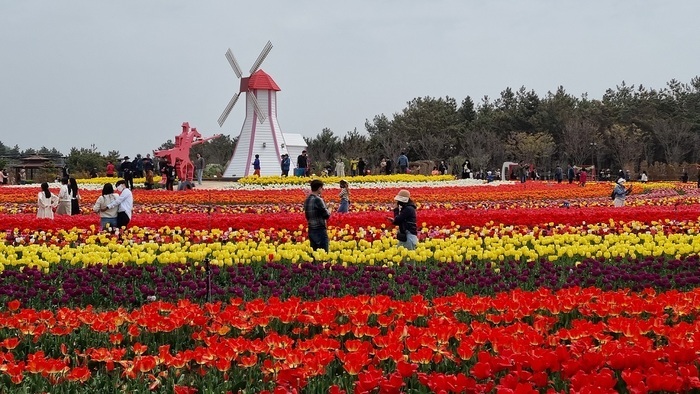

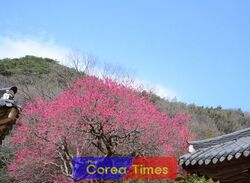

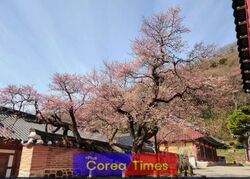

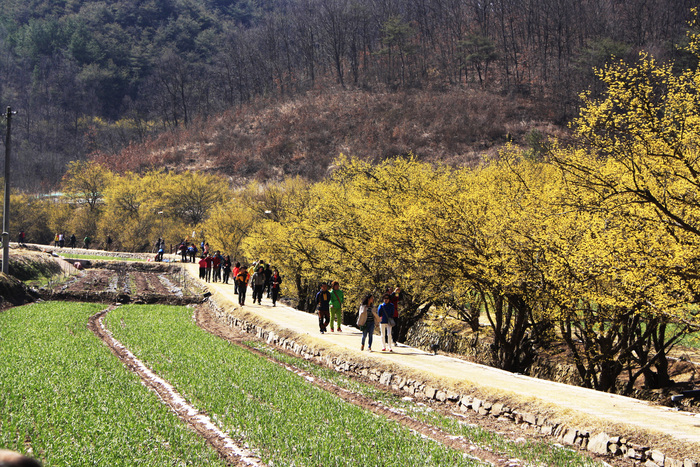
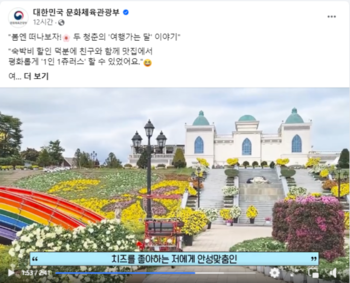

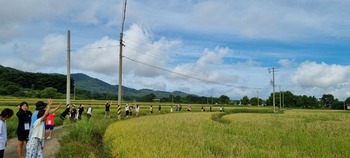
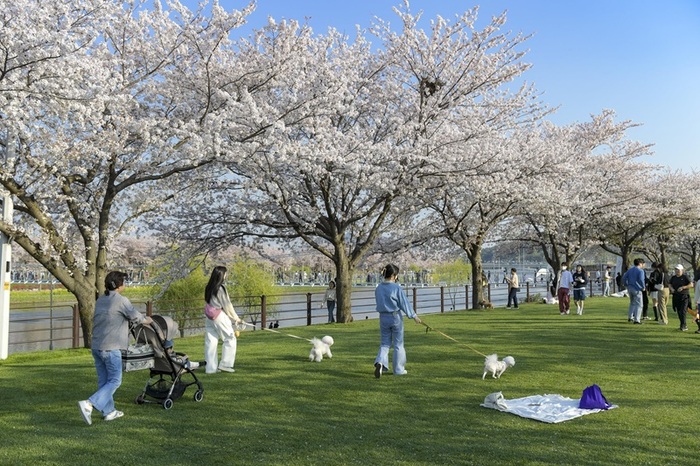
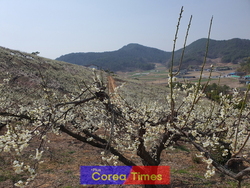
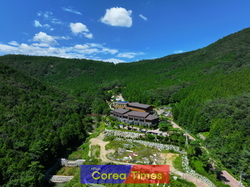
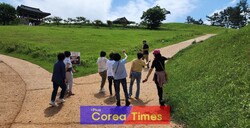
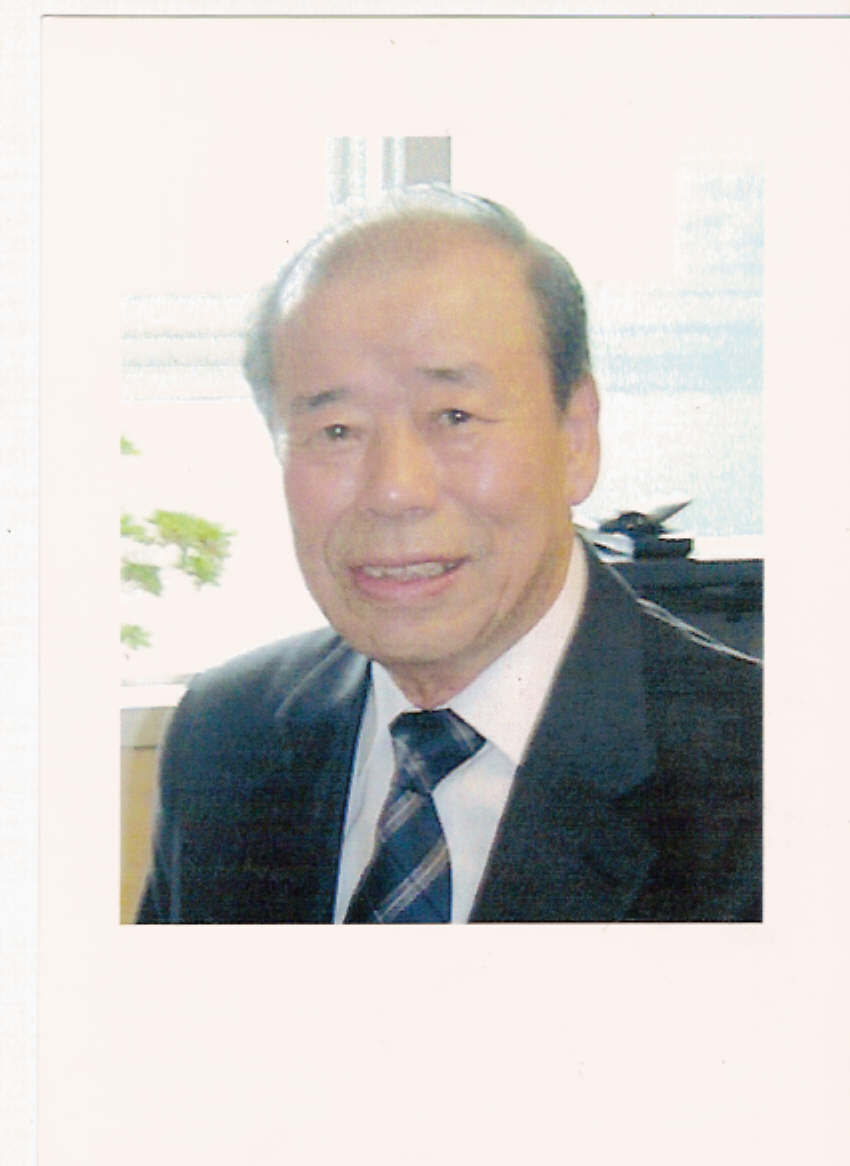
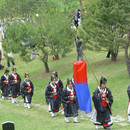


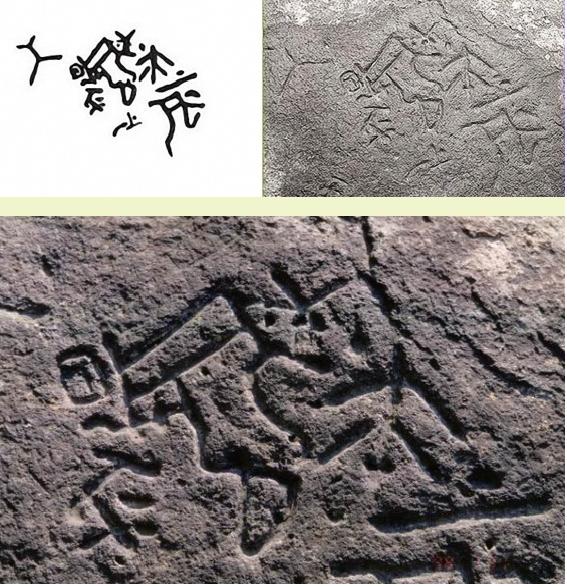
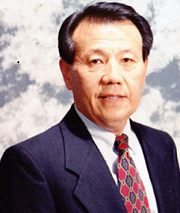

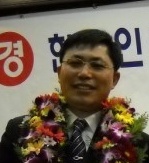
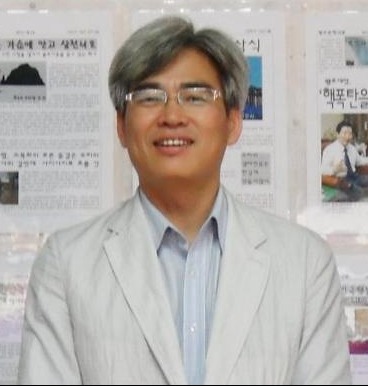
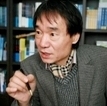
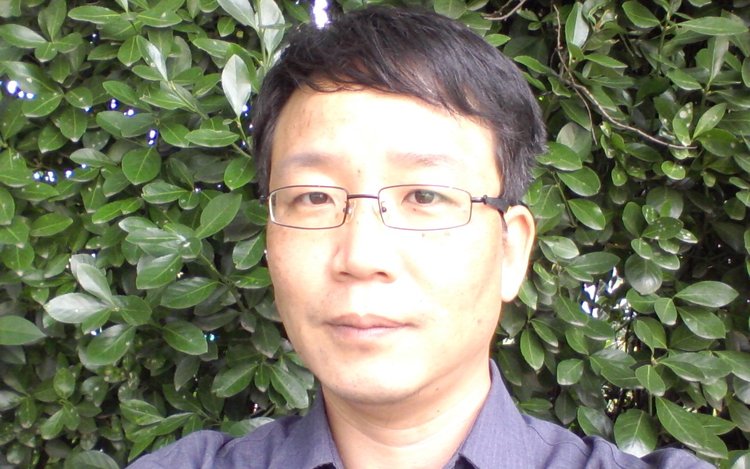
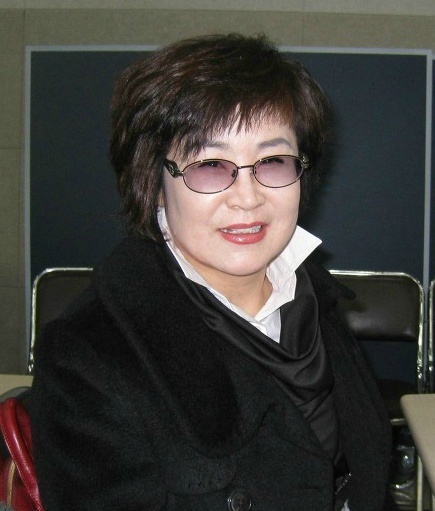
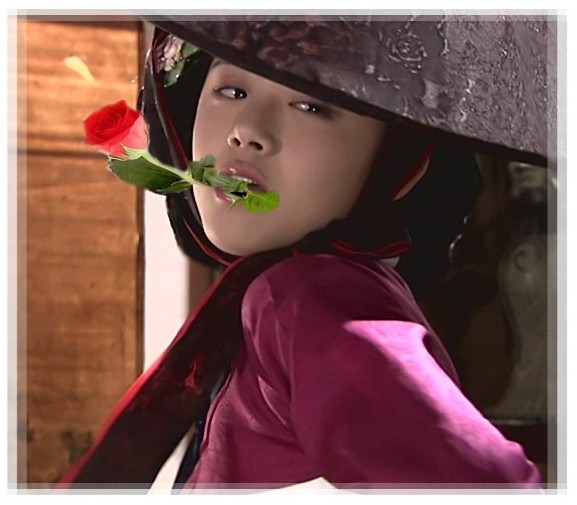
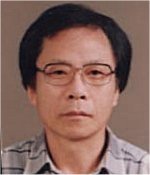
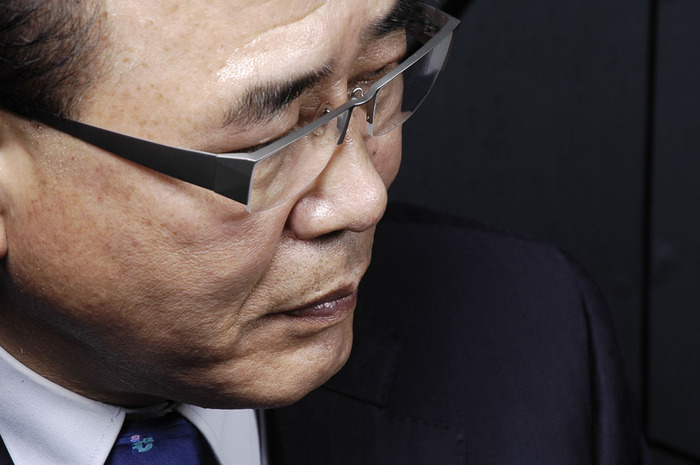
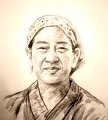

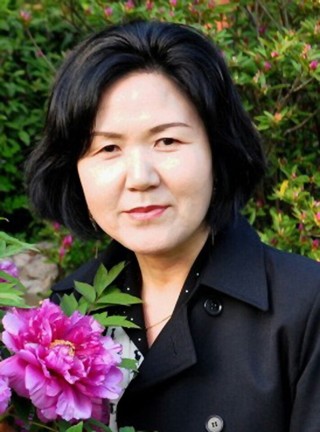
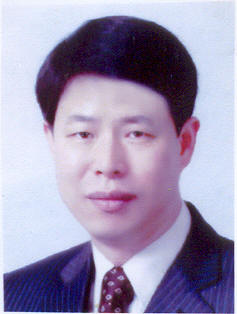

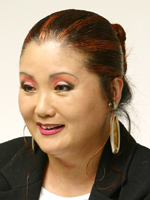
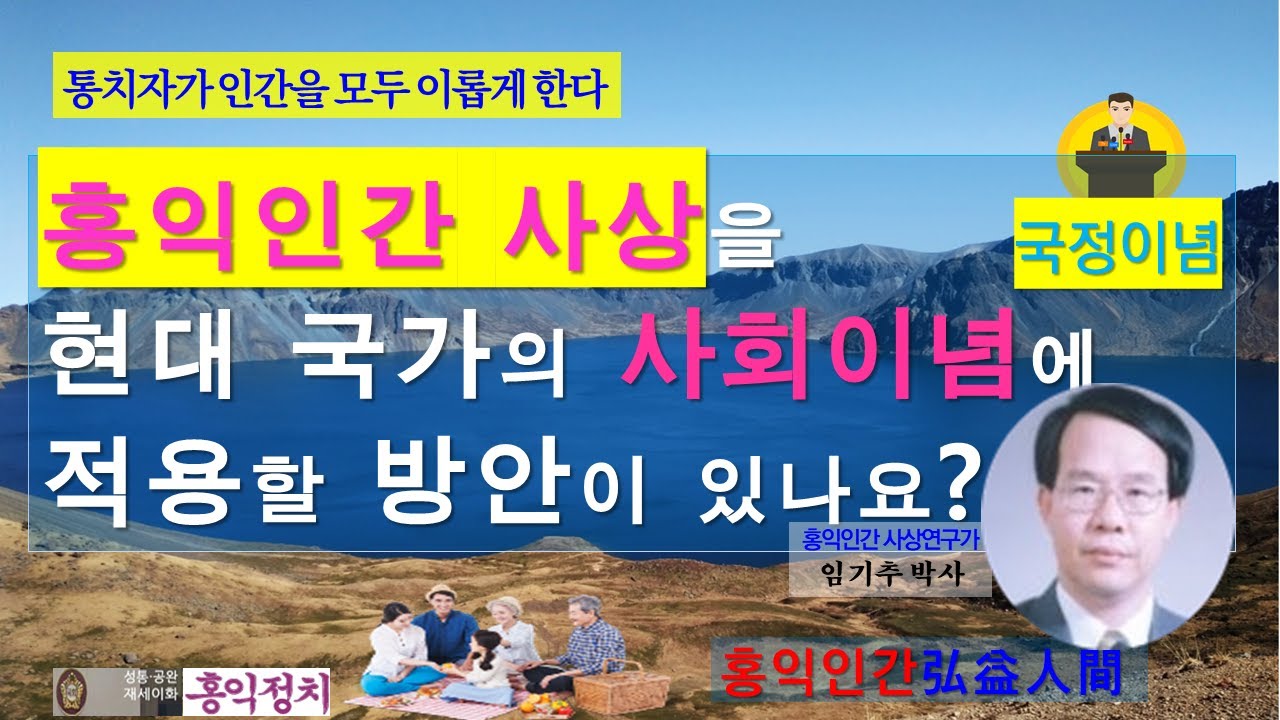

 '잊혀진 계절'누굴위해 존재하는가
'잊혀진 계절'누굴위해 존재하는가
